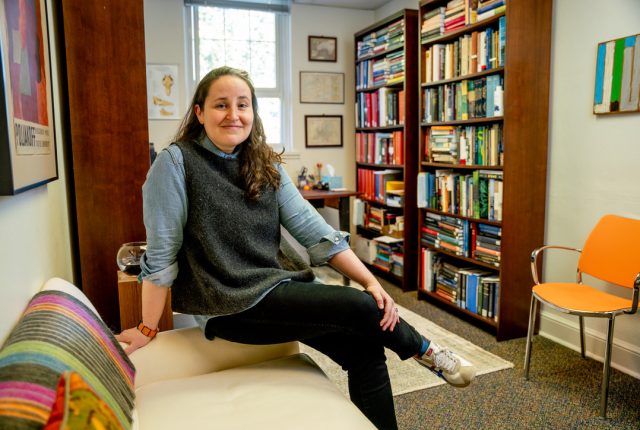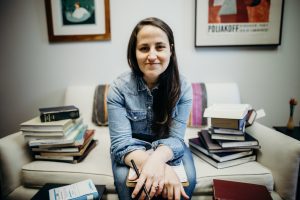
The UCLA CMRS Center for Early Global Studies is excited to welcome Professor Jamie Kreiner, Robert and Dorothy Wellman Chair in Medieval History!
Kreiner is a historian of the early Middle Ages. Her research centers on the mechanics of culture, with a keen interest in the quieter forces that shape ethical systems—forces not always purposeful, individual, or human. This thematic thread runs through her exploration of narrative, cognition, the interplay between science and religion, and ecologies.
Kreiner’s work has earned prizes from esteemed organizations such as the Medieval Academy of America, the American Society for Environmental History, and the Society for French Historical Studies. Her research has been supported by several grants and fellowships, including a Mellon Postdoctoral Fellowship at Stanford University and a Mellon Fellowship for Assistant Professors at the Institute for Advanced Study in Princeton, NJ.
We asked Professor Kreiner to answer some questions to learn more about her interest and excitement in joining the Medievalist community at UCLA and, of course, joining our center!
-
What are you excited about in coming to work at the CMRS Center for Early Global Studies?
I’m very excited to get to know and learn from the serious panoply of premodernists affiliated with the Center, both at UCLA and through the California Medieval Seminar. It’s a rare critical mass! -
Why choose to come as a senior scholar in the field to UCLA?
UCLA is the top public university in the country, with a world-class history department and a venerable tradition of medieval studies. That’s already a pretty irresistible combination: situate that intellectual culture in Los Angeles, and you’ve got something extra special. -
Can you share your journey to becoming a historian? What sparked your interest and how did you pursue it as a career?
I became a historian sort of by accident, but it turned out that the work checked multiple boxes for me: you can study basically anything you want, you spend lots of time alone reading and writing and puzzling through problems, and you get to work and learn with people who love asking questions. -
What inspired you to specialize in the Early Middle Ages?
I was majoring in music in college and had to take a history seminar for gen ed. The seminar on Nazi Germany was full, so I signed up for the Early Middle Ages! I didn’t know anything about those centuries, but that was part of the allure: how strange that this period existed, connecting the dots between the height of the Roman Empire and the age of chivalry, and yet I knew so little about it from school or popular culture. In a weird way my own total ignorance helped me register how complicated the past is. Monty Python’s Holy Grail helped, too. -
As an incoming professor at UCLA, what are you the most excited about?
The people! Academics learn so much from their students and colleagues and I can’t wait to hear what they have to say. -
What do you hope your students will gain from your courses academically and/or personally?
Even the stuff that seems simple or straightforward contains hidden stories and perspectives. It’s hard to unearth those more complicated histories, but in learning how to do it, you’ll develop skills that will always serve you well: compassion, curiosity, skepticism, and a high tolerance for ambiguity. -
What advice would you offer to aspiring historians or students passionate about studying history?
Trust yourself when it comes to searching out good stories: if a situation or text or problem seems strange and you find yourself wanting to know more, that’s where you should start digging!
Thank you, Professor Kreiner! We are excited to welcome you to UCLA!


